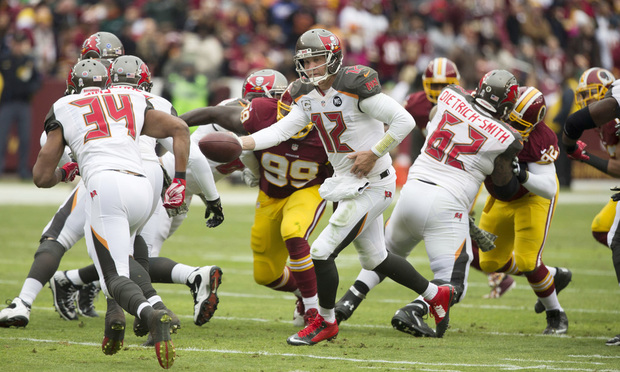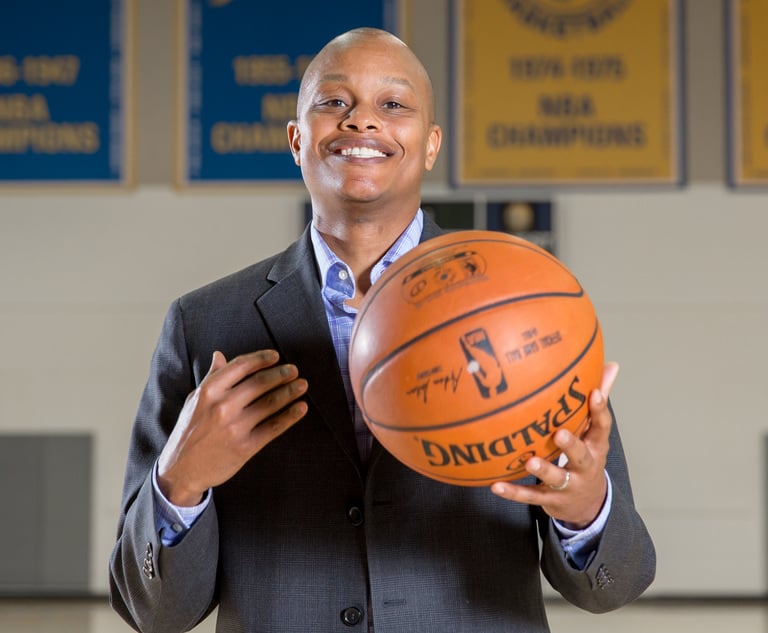Plaintiffs Make Hail Mary Appeal in Case Over NFL's 'Sunday Ticket'
The U.S. Court of Appeals for the Ninth Circuit will hear oral arguments Friday over whether to revive antitrust claims against the National Football League Inc. over its “Sunday Ticket” subscription package.
December 06, 2018 at 06:59 PM
4 minute read
 Tampa Bay Buccaneers play against the Washington Redskins at FedExField stadium. November 16, 2014. Photo: Keith Allison via Wikimedia Commons.
Tampa Bay Buccaneers play against the Washington Redskins at FedExField stadium. November 16, 2014. Photo: Keith Allison via Wikimedia Commons.
Plaintiffs plan to argue Friday that a federal appeals court should revive their antitrust claims against the National Football League Inc. over its “Sunday Ticket” subscription package.
The package offers football fans an opportunity to view games outside their local broadcast area by signing up to DIRECTV at a cost of $2,314 to $120,000 a year. But plaintiffs in a consolidated class action brought in multidistrict litigation alleged that the arrangement restricts competition in violation of federal antitrust law.
Last year, a federal judge in Los Angeles disagreed and dismissed the case, prompting plaintiffs to petition the U.S. Court of Appeals for the Ninth Circuit, which will hear oral arguments on Friday.
“The arrangement is a classic restraint of trade, with predictable results: less consumer choice, less telecast availability, lower viewership, higher prices, and monopoly profits for the participants,” wrote attorney Marc Seltzer in the plaintiffs' opening brief before the Ninth Circuit. “Affirming the decision below would provide a roadmap for firms in every industry to evade antitrust liability, even though the Supreme Court has consistently rejected the elevation of form over substance.”
Seltzer, a partner in the Los Angeles office of Susman Godfrey, will argue against Gregg Levy, a partner at Covington & Burling in Washington, D.C., who represents the NFL.
“Plaintiffs challenge long-standing and procompetitive broadcast arrangements of the National Football League,” Levy wrote in the NFL's response brief. “Those broadcast arrangements ensure that fans across the country can view NFL football games in multiple ways, including through free, over-the-air television broadcasts every Sunday afternoon during the NFL season.”
Levy declined to comment, and Seltzer did not respond to a request for comment.
The litigation is among several cases tackling how sports leagues and satellite and cable providers sell out-of-market games through bundled packages available on televisions, computers or other electronic devices. In 2015, a federal judge approved the settlement of a similar class action against the National Hockey League.
Unlike in other sports, the DIRECTV arrangement is exclusive. It was a big part of AT&T Inc.'s $48.5 billion merger with DIRECTV, which the Federal Communications Commission approved in 2015.
Plaintiffs are individual and commercial subscribers of the package, such as restaurants and sports bars, that allege they overpaid for out-of-market games in violation of the U.S. Sherman Antitrust Act. The NFL brought in a big defense team in the case that included Levy and Beth Wilkinson of Wilkinson Walsh + Eskovitz. Kirkland & Ellis represented DIRECTV, which pushed to send the cases into arbitration.
U.S. District Judge Beverly Reid O'Connell in Los Angeles granted the NFL's dismissal motion with prejudice and denied DIRECTV's arbitration motion as moot.
In her ruling, O'Connell divided the case into two: a horizontal agreement between the NFL teams to pool their broadcasting rights, and a vertical agreement between the NFL and DIRECTV to sell those rights.
O'Connell upheld the horizontal arrangement because, without pooling the teams, there would be no way to broadcast game footage and, in any event, plaintiffs lacked standing since they did not purchase the Sunday Ticket package from the NFL.
As to the vertical arrangement, she found that the exclusive deal with DIRECTV did not reduce output—the total number of broadcast football games. O'Connell relied on the U.S. Supreme Court's 1984 decision in National Collegiate Athletic Association v. Board of Regents, which held that the NCAA had violated antitrust laws by restricting the output of its broadcast games.
“This artificial compartmentalization of plaintiffs' case was wrong because the agreements are designed to work together to minimize competition,” Seltzer wrote in his brief.
Joining plaintiffs were a group of 11 “economists,” all professors, who filed an amicus brief before the Ninth Circuit that reiterated plaintiffs' argument on dividing the agreements, among other things.
“The court's definition of output flies directly in the face of the economic definition of output for this relevant market, namely, NFL game broadcasts actually viewed or purchased by fans on television or via games streamed by the individual team owners, themselves,” they wrote.
Levy, in his response brief, disagreed.
“Plaintiffs do not—and cannot—allege facts that support an inference that the NFL Sunday Ticket agreement reduces output,” Levy wrote. “This is the product that the defendants collectively produce and that plaintiffs ultimately consume.”
This content has been archived. It is available through our partners, LexisNexis® and Bloomberg Law.
To view this content, please continue to their sites.
Not a Lexis Subscriber?
Subscribe Now
Not a Bloomberg Law Subscriber?
Subscribe Now
NOT FOR REPRINT
© 2025 ALM Global, LLC, All Rights Reserved. Request academic re-use from www.copyright.com. All other uses, submit a request to [email protected]. For more information visit Asset & Logo Licensing.
You Might Like
View All
On The Move: Squire Patton Boggs, Akerman Among Four Firms Adding Atlanta Partners
7 minute read

Judge Grills DOJ on Trump’s Birthright Citizenship Executive Order

NBA Players Association Finds Its New GC in Warriors Front Office
Trending Stories
- 1States Accuse Trump of Thwarting Court's Funding Restoration Order
- 2Microsoft Becomes Latest Tech Company to Face Claims of Stealing Marketing Commissions From Influencers
- 3Coral Gables Attorney Busted for Stalking Lawyer
- 4Trump's DOJ Delays Releasing Jan. 6 FBI Agents List Under Consent Order
- 5Securities Report Says That 2024 Settlements Passed a Total of $5.2B
Who Got The Work
J. Brugh Lower of Gibbons has entered an appearance for industrial equipment supplier Devco Corporation in a pending trademark infringement lawsuit. The suit, accusing the defendant of selling knock-off Graco products, was filed Dec. 18 in New Jersey District Court by Rivkin Radler on behalf of Graco Inc. and Graco Minnesota. The case, assigned to U.S. District Judge Zahid N. Quraishi, is 3:24-cv-11294, Graco Inc. et al v. Devco Corporation.
Who Got The Work
Rebecca Maller-Stein and Kent A. Yalowitz of Arnold & Porter Kaye Scholer have entered their appearances for Hanaco Venture Capital and its executives, Lior Prosor and David Frankel, in a pending securities lawsuit. The action, filed on Dec. 24 in New York Southern District Court by Zell, Aron & Co. on behalf of Goldeneye Advisors, accuses the defendants of negligently and fraudulently managing the plaintiff's $1 million investment. The case, assigned to U.S. District Judge Vernon S. Broderick, is 1:24-cv-09918, Goldeneye Advisors, LLC v. Hanaco Venture Capital, Ltd. et al.
Who Got The Work
Attorneys from A&O Shearman has stepped in as defense counsel for Toronto-Dominion Bank and other defendants in a pending securities class action. The suit, filed Dec. 11 in New York Southern District Court by Bleichmar Fonti & Auld, accuses the defendants of concealing the bank's 'pervasive' deficiencies in regards to its compliance with the Bank Secrecy Act and the quality of its anti-money laundering controls. The case, assigned to U.S. District Judge Arun Subramanian, is 1:24-cv-09445, Gonzalez v. The Toronto-Dominion Bank et al.
Who Got The Work
Crown Castle International, a Pennsylvania company providing shared communications infrastructure, has turned to Luke D. Wolf of Gordon Rees Scully Mansukhani to fend off a pending breach-of-contract lawsuit. The court action, filed Nov. 25 in Michigan Eastern District Court by Hooper Hathaway PC on behalf of The Town Residences LLC, accuses Crown Castle of failing to transfer approximately $30,000 in utility payments from T-Mobile in breach of a roof-top lease and assignment agreement. The case, assigned to U.S. District Judge Susan K. Declercq, is 2:24-cv-13131, The Town Residences LLC v. T-Mobile US, Inc. et al.
Who Got The Work
Wilfred P. Coronato and Daniel M. Schwartz of McCarter & English have stepped in as defense counsel to Electrolux Home Products Inc. in a pending product liability lawsuit. The court action, filed Nov. 26 in New York Eastern District Court by Poulos Lopiccolo PC and Nagel Rice LLP on behalf of David Stern, alleges that the defendant's refrigerators’ drawers and shelving repeatedly break and fall apart within months after purchase. The case, assigned to U.S. District Judge Joan M. Azrack, is 2:24-cv-08204, Stern v. Electrolux Home Products, Inc.
Featured Firms
Law Offices of Gary Martin Hays & Associates, P.C.
(470) 294-1674
Law Offices of Mark E. Salomone
(857) 444-6468
Smith & Hassler
(713) 739-1250






